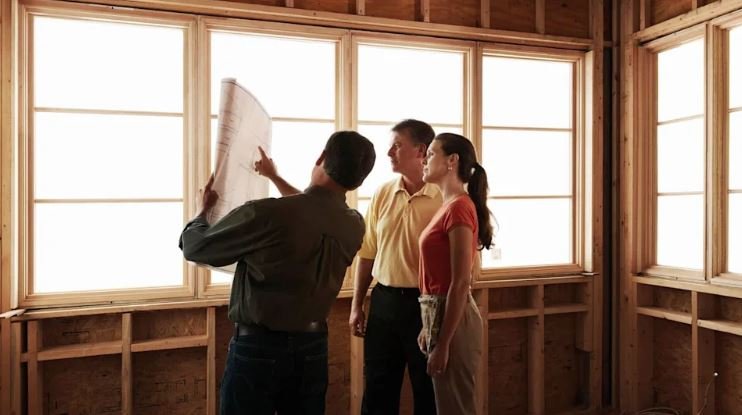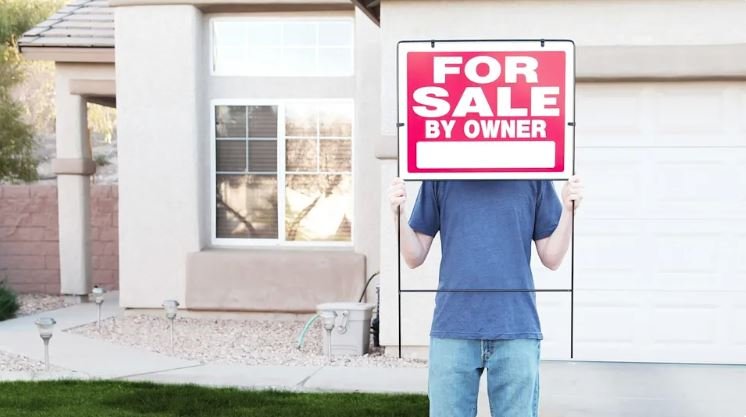Common Real Estate Myths That You Need To Know
Jodi Thornton-O'Connell
April 30, 2021·19 min read
SDI Productions / Getty Image
Home shopping may be ramping up as more Americans are looking to move out of their expensive city homes to more affordable ones in the suburbs. Despite the ups and downs of the stock market, the real estate market has remained hot; with competition for homes at an all-time high, there’s no time for rookie mistakes.
See: Real Estate Agents Reveal Their Secrets To Get Your Home Off the Market Fast
Debunk the most common real estate myths.
Last updated: Apr. 30, 2021
aerial shot of a suburb neighborhood
Myth: Looking at Homes Is the Best First Step
It might be tempting to visit open houses, drive through neighborhoods where you’d like to live and talk to neighbors and friends. But your transaction will go much smoother if you get your ducks in a row first.
The truth: “Assuming that you will be financing your purchase, the first step is to get a preapproval letter — or a prequalification letter at a minimum — from a lender of your choice,” said Keith Hickman, realtor at Compass in Beverly Hills, California. “This will not only prepare you to make an offer when the time is right but will help you to focus your search within the price range that you qualify for and are comfortable with.”
Watch Out: 50 Cities With the Most Overpriced Homes
an estate agent shows a couple around a refurbished period home.
Myth: You Don’t Need an Agent To Buy a Home
Did you know that you can sell your home without an agent? In fact, you can even buy a home without an agent.
“It’s true that sites such as StreetEasy, Zillow and Trulia have made it easy for consumers by providing them with information at their fingertips,” said Judy Williams, licensed real estate salesperson with Halstead Properties in Manhattan. However, “many underestimate the value an experienced agent can bring to them.”
The truth: Buyer agents have a duty to put your best interests in the transaction at the forefront. They can provide you with knowledge about the current market conditions and use their expertise to negotiate the best deal for you.
“For buyers, an organized agent will ensure that you have all your ducks in a row regarding paperwork and walk you through the process,” said Williams.
City Living: 40 Top Cities Where Your Paycheck Goes the Furthest
home inspection
Myth: Buying a New Home Means Few Repairs in Years To Come
“Modern home builders have a strong incentive to build quickly and with the least expense in order to maximize profits and move on to the next project,” said Hickman.
But, there are some hidden expenses of building a new home. And quick builds designed to maximize profits can result in homes with lower-quality craftsmanship and some important construction details overlooked.
The truth: Employ a home inspector specializing in new home construction to discover potential problems, such as walls with little soundproofing or marble countertops that haven’t been properly sealed.
“The time to have these things identified and fixed is before you close on your new home,” said Hickman.
Did You Know? Best Place To Buy a Home in Every State
young family of new homebuyers putting up picture frames
Myth: You’ll Need a 20% Down Payment Plus Closing Costs
“Having the spare capital to put 20% down on a home purchase is great, but it’s certainly not the norm,” said real estate investment educator and property management specialist Denise Supplee of SparkRental.
The truth: “There are many programs such as FHA mortgages where you only need as little as 3.5% down and some of the closing costs can be covered as well,” said Supplee.
Father and daughter at apartment, domestic room, crowded with bills to pay.
Myth: A Down Payment Is the Only Upfront Cost
Don’t get sticker shock when you head to the escrow company to sign your final papers. Your down payment doesn’t cover things such as a home inspection, termite inspection or closing costs, which can range from 3% to 6% of the purchase price.
The truth: Many closing costs are negotiable, so you can ask the seller to pay them. If you need to finance closing costs, ask your lender about an FHA loan where some closing costs can be added to the loan.
Young couple holding the keys for their new home
Myth: Getting Preapproved Will Hurt Your Credit
Seth Lejeune of Berkshire Hathaway Home Services in Phoenixville, Pennsylvania, said one of the top real estate myths he encounters is from those who haven’t spoken to a lender.
“They believe that even speaking to a lender will ‘ding’ their credit,” he said. “Moreover, they think getting preapproved will ‘ruin’ their credit. This prevents them from even entertaining the notion, which is a big mistake.”
The truth: Getting prequalified is only a soft hit on your credit, causing absolutely no impact. Once you apply for preapproval of a mortgage, it shows a hard pull on your credit.
However, credit scoring models take into account that you might be shopping around and only count several mortgage applications within two weeks to 30 days as a single inquiry, according to Experian.
Young woman looking deep in thought and smiling while lying back in a deck chair on her patio on a sunny afternoon
Myth: There’s Plenty of Time for Preapproval When You Find the Right House
Waiting to get a loan approval letter until you find a home that you want to make an offer on puts you at a disadvantage in a competitive market, according to Hickman.
The truth: “Most offers will not be accepted without a lender approval letter,” he said. “Potential buyers that have their approval letter in hand will be in a better position to move quickly with a successful offer.”
home buyers, house for sale, real estate agent
Myth: You Should Never Offer Full Price
“These days, low-ball offers on move-in ready homes don’t fly in my local market,” said Justin Davis of Keller Williams Realty in Albuquerque, New Mexico. “When housing inventory is low and demand is sky-high, you need to come in with a respectable, competitive offer.”
The truth: “Low offers can be insulting to sellers and are generally not a good way to open up a transaction,” said Davis. “If you really want the home and it is priced reasonably, offer close-to or at list price. In some markets, you may even want to offer over list price to secure the home of your dreams. This is where a great agent will help you come up with a winning offer-strategy.”
committee
Myth: Buying a Condo Is Just Like Buying a Home
Perhaps you’re looking to escape the restrictions of your rental apartment so you can decorate or remodel as you please, and you set your mind to buying a condo. Before you start making remodeling plans for your soon-to-be condo, hold on.
The truth: “You might think you can do whatever you want in a condo; that there are no rules,” said Jesse Kent, director of communications of Triplemint in Manhattan. “If you are renovating a condo, you still need to get approvals from the condo board and, when necessary, the architect for the condo.”
Home Ownership: The Cost To Own a 3-Bedroom Home in Each State
Young woman watering plants at home garden on the balcony.
Myth: Avoid Buying a First-Floor Condo
Safety, privacy and noise levels are a few reasons buyers tend to shy away from first-floor condos. But don’t pass up a great deal just because it’s on the ground level.
The truth: Window shades that open from the top down can keep out inquisitive stares from passers-by, and decorative iron grills can exclude intruders. Add acoustical paneling inside and a solid door that fits well to eliminate sounds from the outside world.
School kids crossing street.
Myth: Schools Don’t Matter If You Don’t Have Kids
Let’s face it: Homes in the best school districts cost significantly more — about $50 per square foot, according to Redfin — than those in districts where test scores are average or worse. If you don’t have kids, it can be tempting to get more house for your money in an area with average education standards.
The truth: When it comes time to resell your home, those in the better school districts will hold their value better and give more return on your investment. So if it’s within your budget, consider buying a home in a good school district.
Couple Drinking Wine And Making Toast On Rooftop Terrace With City Skyline In Background.
Myth: Buying Is Always a Better Financial Deal Than Renting
Buying a home can be a good investment — if you stay in it long enough to see a profit. To find out if renting will be cheaper than buying a home over the long haul, figure out the total of what a purchased home will cost you during the time you plan to own it.
The truth: Your upfront costs such as points, closing costs, insurance, interest and maintenance must be figured into a long-term cost comparison to renting a similar unit. Remember to add in the costs of selling your home into your calculations, such as realtor commissions, appraisal fees and closing costs.
Compare the result to the amount of the monthly rent you’d pay for a similar home plus rental insurance during the same time period. If you plan to stay in a home just a few years, it could cost more to buy than rent.
Take a Look: The 50 Best Cities for Renters
Home, multi-family home, real estate
Myth: Single-Family Homes Are More Affordable Than Multi-Family Dwellings
The list price of a multi-family dwelling might come with a higher price tag than a single-family home, but it can be more affordable overall.
“Although a single-family home sells cheaper, buyers will have to carry the entire payment on their own,” said Anna Russo, CEO at Home Mega Management in Fresh Meadows, New York.
The truth: A multi-family home can be more affordable if you rent out the extra space you don’t use.
“When purchasing a multi-family unit, they will have the extra apartment for renters, which will increase their earnings and will cover at least 50% of their monthly mortgage payment,” said Russo.
Excited Children Arriving Home With Parents - Image.
Myth: You Must Sell Your Current Home Before Buying a New One
“Rental real estate is a great way to create wealth, equity and extra income,” said Ryan Stewman, real estate sales and marketing expert with the Break Free Academy and author of “Elevator to the Top.” “Most people believe you can only have one mortgage or own one home at a time, and that’s just not the case these days.”
The truth: Talk to your lender about extra requirements to keep your present home as a rental property to generate tenant income while buying a new one. These might include a special type of appraisal on the home you intend to rent to tenants and bank, or investment reserves of 2% to 6% unless your present home is paid off.
Woman petting dog while working from home
Myth: Your Preapproval Amount Will Be the Loan Amount You’re Approved For
Loan pre-approval is a pretty thorough process, requiring you to provide documentation that backs up your income and credit worthiness. But that doesn’t mean your loan will necessarily be in that amount.
The truth: “It all depends on the appraisal,” saud Ron Lennox of Lennox Home Buyers in Houston. “Just because you contract the house for a certain price, that doesn’t mean the mortgage company will approve the amount of the sale price.”
This means you could be left with the choice of renegotiating the contract, coming up with extra funds out of pocket or walking away from your dream home if it appraises too low.
home inspection
Myth: You Don’t Need a Home Inspection
It might be tempting to save a few hundred dollars by skipping a professional home inspection and having a friend or family member look over the home. Don’t do it, said Hickman.
The truth: Home inspectors look for more than 1,600 specific items in the home, helping you avoid tricks that hide a home’s flaws.
“Unless your family member is a professional home inspector, you could be in for some very unpleasant surprises after the purchase,” said Hickman. Hire an inspector with high customer ratings, and accompany them through the home to ask them to explain what they are seeing.
Buying a Home in 2021? Here’s What You Need To Know
An African American couple walking on a residential street, with a young man holding a folder.
Myth: You Should List Your Home With a ‘Super Agent’
“Many top Realtors are actually teams or groups made up of Realtors with various skill and experience levels,” said Ryan Hardy, luxury real estate broker at Gold Coast Realty.
The truth: Although top-producing listing agents might advertise an eye-popping number of sold properties, the high number is the result of a team of 15 or 20 agents.
“All of the team sales are closed under one Realtor’s name and, although the namesake Realtor may show up to the listing appointment, that is probably the last time you’ll see or hear from them,” said Hardy.
More likely, you’ll be assigned to an assistant or junior Realtor, who will handle the showings, contract and escrow transaction from start to finish
Christmas, Christmas decor
Myth: Remove All Holiday Decorations Before Listing Your Home
Personal effects such as family photos and travel souvenirs distract potential buyers from seeing themselves living in the home because they see you living there instead.
The truth: One exception is simple and tasteful holiday decorations, which can add warmth and a homey ambience. The National Association of Realtors suggests a small, simple tree and fresh boughs for Christmas, a dish of candy corn for Halloween and jelly beans at Easter.
blue wall, home decor, living room
Myth: Always Redecorate in Neutral Tones
Although repainting children’s rooms swathed in color to a neutral tone is usually a good idea to appeal to a wide range of buyers, the advice doesn’t necessarily hold true for all rooms of your house.
The truth: Walls in bold colors can play up architectural features or divide room areas from one another visually. The National Association of Realtors recommends an alternative of softening strong colors with fresh greenery or neutral rugs or furnishings.
couple having consultation with a real estate agent inside a new home.
Myth: Set the List Price Above Comparables To Build in Bargaining Room
Listing a home at a much higher price than what comparable reports show or real estate experts provide seems like a good idea to make sure your home sells for all its worth.
“Sellers commonly will say, ‘If we don’t ask more, we will never get more,'” said Bruce Ailion, Realtor and attorney at RE/MAX Town and Country in Atlanta.
The truth: “This is factually wrong,” said Ailion. “On average, homes will bring real market price. Asking that plus 10% is more likely to cause the home to stay on the market longer, generate less activity and interest, and ultimately sell for less than the market.”
happy couple standing next to for sale sign shaking hands with real estate agent
Myth: Setting a Low Price Means You’ll Make Less Money
Not necessarily so, according to the National Association of Realtors. In fact, this strategy could help you sell your home for more money.
The truth: A lower-priced home will attract more attention from a greater number of buyers. In a competitive housing market, this could lead to interested buyers striving to outbid one another for the home. The end result could be getting offers for more than you asked for in the list price.
bad real estate agent
Myth: Negotiate the Realtor’s Commission To Net More Profit
A common seller myth is that offering a lower commission will net more money.
The truth: “Nothing is further from the truth,” said Ailion. “What this will do is cause agents with the most qualified buyers to go to the higher listed commission properties first and show the lower commission properties with less enthusiasm. The result is that fewer interested buyers will see your property and fewer cooperating brokers will show it, and it’s more likely that your listing agent will seek to earn the full commission rather than splitting the commission with another agent.”
home staging
Myth: Professionally Staging a Home Is Necessary for a Quick Sale
Staging your home to make it the most appealing to the greatest number of buyers can help it sell 88% faster for an average of 20% more than non-staged homes, according to the National Association of Realtors. But professional staging comes with a price tag that can cost hundreds of dollars each month.
The truth: “Staging a home is not a bad task,” said Supplee. “But the best thing you can do to sell a home quicker is to price it competitively, market it aggressively and make it available easily for showings.”
African American, home buyers, real estate agent
Myth: If Your Home Isn’t in Great Condition, No One Will Buy It
It’s true that some remodeling projects can increase your home’s value. But if your home is dated or needs major repairs, it doesn’t necessarily mean no one will want to buy it.
The truth: “There are people that only buy homes that are in poor condition and require updating or major repairs,” said Matthew Miller, managing partner of Stockpile Property Ventures in Los Angeles. “These are typically local real estate investors and professional home buyers who update and renovate properties as a business. If your current home needs some work, consider selling the property to a professional home buyer.”
Realtor Showing Hispanic Couple Around New Home
Myth: List Your Home With a Neighborhood Expert
Before the days of abundant information freely available on the internet, a real estate agent who was a neighborhood expert was a valuable tool for prospective buyers to find out information about listings, such as which schools had waiting lists or other crucial area information.
The truth: “The neighborhood expert markets their properties the exact same way that that the non-experts do,” said Gary Lucido, president of Lucid Realty in Chicago. “The real difference in agents and one that matters tremendously and may often be confused with being a neighborhood expert is in their professionalism, intelligence and responsiveness.”
Real estate agent showing new house to couple - Image.
Myth: Open Houses Are a Waste of Time
You might have heard that open houses just attract lookie-loos, and agents only hold them to find prospective buyers. Although the national percentage of homes that sells through an open house is 2% to 3%, there are definite advantages to holding them.
The truth: “Today’s buyers are tech-savvy and spend a considerable amount of time browsing the web,” said Abraham Walker, lead agent at Ask a Walker in Alexandria, Virginia. “Many of these buyers are preapproved and ready to make an offer. When they see the opportunity to view a house at their convenience, they take it.”
An open house shortly after listing generates attention and gives your agent a valuable opportunity to gather any feedback that might hinder a quick sale.
Do It Right: 26 Home Renovations You Can Make for $500 or Less
One young man is lying down on the floor after a hard days work painting his new apartment.
Myth: You’ll Recoup Remodeling and Home Improvement Costs When You Sell
Don’t expect to see 100% return on your remodeling investment in your home.
The truth: According to Realtor.com, the return rate averages just 64% of your initial outlay. That said, some upgrades can add significant value to the price of your home.
The most recent analysis by the National Association of Realtors cited door replacements such as upgraded garage doors, mid-range wood window replacement and steel outer doors as the only items returning 100% of their cost. Minor kitchen remodels offered the highest rate of return at 79.3% of remodeling costs.
how to sell your home
Myth: The Highest Price Is Always the Best Offer
Many buyers and sellers believe that an offer with the highest price is always the best offer.
The truth: “In reality, the best offer is the one with the highest probability of closing,” said Allen Schild, real estate broker for @Properties in Chicago. “This may come in the form of a cash offer, an offer containing the fewest contract contingencies or the shortest time needed to close.”
Husband and wife consulting with a architect inside a home under construction.
Myth: Wait Until the Property Is Under Contract for a Home Inspection
Buyers have the option to bring in an inspector to find any hidden problems with the home. Smart sellers buy their own home inspection prior to putting the home on the market.
The truth: For the price of a few hundred dollars, a home inspector will go through the home thoroughly, giving you the opportunity to make minor repairs or take care of deferred maintenance before entering a contract.
You can also disclose any issues before a buyer enters a contract. This prevents your sale from falling through or taking a price reduction based on the buyers home inspection contingency clause in the contract.
Daylight fades over a snow-covered suburban home - Image.
Myth: Winter Is a Bad Time To Sell
Late spring is the best time to list your home, according to Zillow. But the winter experiences a significant peak as well, especially in the Southern states.
The truth: “Sometimes, sellers focus solely on the fact that there are likely fewer buyers in the off season and ignore the fact that there is also a corresponding reduction in listings,” said Kevin Mack, real estate broker for @Properties in Evanston, Illinois. “There is less competition for well-positioned properties. Statistics clearly show that the supply of inventory typically reaches its lowest point in the winter months. Smart, realistic, savvy sellers should be all too happy to put their place on the market in the winter.”
"Photo of a man standing in front of his house, hiding behind a For Sale sign.
Myth: Save Money by Marketing Your Home as a ‘For Sale by Owner’
It’s a common belief that you can save money by eliminating all real estate agents and selling your house on your own.
The truth: “Nothing can be further from the truth,” said Marla Forbes, real estate broker for @Properties in Highland Park. “Time and again, I see unrepresented buyers overpaying and sellers under selling because they really do not know the intricacies of their particular market or property.”
A full-time professional broker has way more market knowledge and insight than the average consumer who is buying or selling one property every few years. Although a client pays a broker a commission, the money saved on a purchase — or the extra dollars made on a sale — will compound over time making the broker commission a small price to pay for the extra financial gain.”
More From GOBankingRates
Money’s Most Influential: Where Do Americans Get Their Financial Advice?
‘Rich Dad Poor Dad’ Author Robert Kiyosaki: You Should Never Say ‘I Can’t Afford That’
This article originally appeared on GOBankingRates.com: Common Real Estate Myths That You Need To Know








































